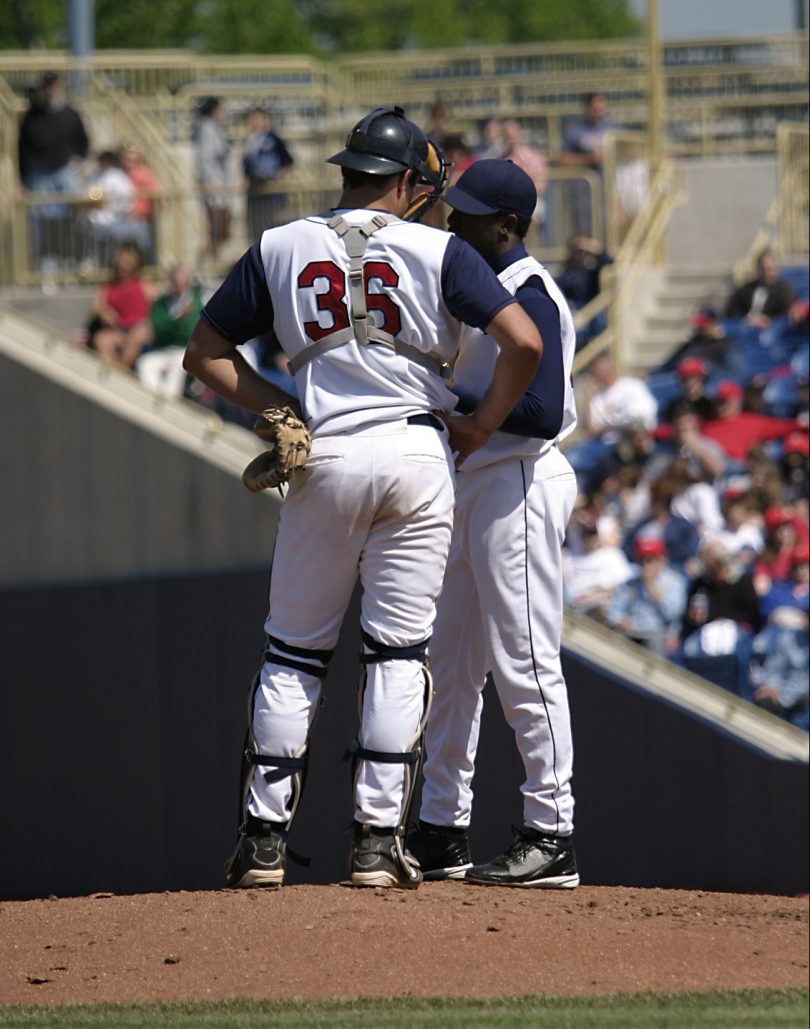Think The Game
Working hard to build your strength and improve your skills on the field is important, but if you want to play college baseball, you will also need to improve your ability to “think the game.” Commonly referred to as the mental game, thinking the game is more than a player’s understanding of the rules (although that is very important!)—it’s also his ability to know what to do and when to do it on the field. Thinking the game requires both a high baseball IQ and emotional control. Players who can “think the game” can make the right in-game decisions quickly, even when they are under pressure. They have the ability to control what they have complete control over (thoughts, emotions, effort, decision-making, preparation, etc.) and their reactions to what they don’t have control over (results, umpire calls, the opinion of others, etc.). In college baseball, the best players demonstrate a strong combination of physical and mental skills, and that’s what college coaches will be looking for when they watch you play. The best players can slow the game down when things are moving fast and stay a step ahead of the competition. Want to learn more? Continue reading!
Covering All the Bases
First Base: Increase Your Mental Practice
Experienced players can remember what happened in games they’ve played in the past. Their memories of successes and mistakes can help them know what they should do in certain in-game situations. If you have never played baseball at a competitive level, you may feel at a disadvantage. That’s where our Think the Game section comes into play! Think the Game offers a way of learning what to do during games through the experiences of others, so you don’t make the same mistakes. Each article describes an in-game situation, including mistakes that have been made by players. At the end of each article, you will be asked to think through what went wrong and what should have been done differently. With hundreds of Think the Game situations for you to read, you can improve your mental game even when you are away from the field.
Second Base: Control What You Can Control
Baseball is often called a game of failure. The best hitters succeed 3 out of 10 times. The best pitchers only throw 60-75% strikes. The players who have the most success are the ones who work hard to control the things that they have direct control over. For example, hitters who focus on swinging only at balls in the strike zone (something they can control) will be more successful than hitters who try to get a hit every time they are up (something they can’t always control). Pitchers who focus on executing the next pitch rather than dwelling on the umpire’s last call will be more successful than those who can’t move on. Challenge yourself to pour all of your energy into things that you have control over (emotion, effort, decision-making, training plans, etc.) and good results will follow. If you get caught up in things you can’t ultimately control (results, batting average, ERA, umpire calls, playing time, etc.), you will waste a lot of time and effort. Here is a great real life example from a game. When college coaches evaluate you, they will be trying to figure out if your focus is in the right place. Focus on what you can control!
Third Base: Control Your Reaction to What You Can’t Control
In baseball, you are faced with a lot of things you can’t control. Bad calls, bad weather, bad hops, coaching decisions, and injuries can make a difference in your on-field performance but you can’t control any of them directly. While you can’t control these things, you can control the way you react to them. Instead of getting upset about a bad call, focus on making the next play. Rather than quitting because you start the season on the bench, focus on improving your weaknesses, being a supportive teammate, and earning more opportunities to play. When you are in control of your emotions and put your effort and focus into what you can control, you will realize that you don’t have to be on an up-and-down roller coaster where everything has to go your way to have success. Hall of Famer Lou Gehrig once said, “The ballplayer who loses his head, who can’t keep his cool, is worse than no ballplayer at all.” You can bet college coaches will be looking at the way you control your reactions to on-field challenges.
Home Plate: Be a Smart Competitor
Each new level of baseball you reach will come with new and different interactions with teammates and competitors. In fact, you should expect that your teammates at the college level may try to test you by ignoring you, teasing you, or making you the brunt of jokes to see how you react. College baseball is very competitive and playing time is limited. A new player can feel like a threat to the current players. This happens in competitive levels from travel ball to college, where “established” players want to see if you can fit in with the team, if you pose a threat to their playing time, and whether or not you can play up to their level. These challenging interactions may not last long, but you’ll want to be aware of the possibility so you aren’t caught off guard. Players and opponents at the college level can often be more focused on their performance and the competition than helping other players out or being friendly. The best way for you to deal with these early challenges is to continue to work hard, be a great teammate, be yourself, and understand that when you get between the foul lines, it’s time to compete as hard and as smart as you can.
When you spend time developing your physical skills and mental game, your hard work shows up in a big way on the field. However, your on-field performance is only one of the ways that college coaches will determine if you can play at that level. The quality of your character will be strongly evaluated, and core area 3 explores what you should do to show that you’re the type of person that will succeed on a college team. Click here to read more!







